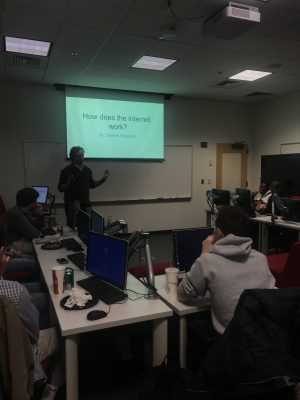 The internet: an everyday tool that has somehow become obscure and mysterious in both its definition and the way it works. On Friday, February 9, Adjunct Professor Stephen Fitzgerald tackled the daunting task of explaining how the internet works in the latest OPIM Innovate workshop. The workshop covered how we connect to the internet, how we send messages through the internet, the divisions of the internet (such as the surface web, deep web, and dark web), and websites.
The internet: an everyday tool that has somehow become obscure and mysterious in both its definition and the way it works. On Friday, February 9, Adjunct Professor Stephen Fitzgerald tackled the daunting task of explaining how the internet works in the latest OPIM Innovate workshop. The workshop covered how we connect to the internet, how we send messages through the internet, the divisions of the internet (such as the surface web, deep web, and dark web), and websites.
The internet began as a Department of Defense project, with the hopes of being able to create a communication network that could survive nuclear attack. In order to do this, the creators of the internet decided to send information in packets, dividing one message into smaller parts, sending those parts on different routes, and reuniting them later on at their appropriate destinations. Each destination that a message will encounter along its travel is referred to as an IP address. IP addresses are a series of unique numbers that distinguish computers depending on the network they are connected to. “IP addresses are like home addresses; so what we want to do is get information from one destination to another. With an IP address, we can track the steps it takes to get from my home router to google,” Fitzgerald said. Although each IP address is different, the amount of addresses is not unlimited because they are coded in binary. This means that at institutions such as UConn, users are able to login to the internet with a specific IP address, but once you log out the information will be recycled for the next user. “There are a few buildings where the huge internets of the world connect to each other. These would be places that connect the millions of IP addresses together like Time Warner, Comcast, etc. and they are filled with routers,” Fitzgerald said as he began to paint a physical picture of how the internet is connected.
“This was a good first workshop to go to because it gave information on how the internet works while reflecting real world issues like net neutrality. I think sometimes if you live on campus at a college you can shut out the outside world, so workshops are a good way to understand the real world applications of things we learn about in school,” said Brittany Reynolds a Management Informations Systems (MIS) and Psychology major (’19). Being able to use the internet is an essential skill for students in their academics and the workplace, but knowing how the internet works is an extremely useful tool for students looking to make an impact in the field of technology. “Knowing about the internet is important. With the amount of information being shared across the internet, it is important to know where that information is going, who has access and who doesn’t, and to be able to control where your information is going,” said Anthony Modolese, a senior finance major in attendance. Modolese and his friend Matthew Kopec have been taking a private independent study on the business of blockchain and are currently learning about the history of the internet. This interest in blockchain has brought them to multiple workshops and they are both interested in attending more in the future.